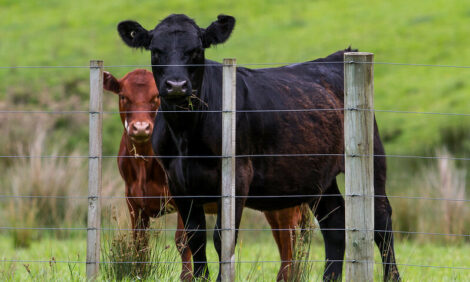



Brazil Has Fastest Food Export Growth Rate
BRAZIL - Brazil’s processed food exports are showing the fastest rate of growth among the world’s major food producers.The fifth largest international exporter, Brazil registered an increase in the sales of these products to foreign countries of 4.8 per cent per annum for the period 2005 to 2010.
According to the GTIS (Global Trade International System) the other four producers ranked above it showed weaker growth for the same period: the US – 12 per cent, the Netherlands – 7.7 per cent, France – 5.6 per cent and Germany – 8.2 per cent.
In addition to this rate of growth, Brazilian processed food and drink exports, which reach 197 countries and accounted for US$ 38 billion in 2010, possesses great diversity and is also growing in quality.
Coordinated by Apex-Brasil (the Brazilian Trade and Investment Promotion Agency), the Brazilian delegation to ANUGA – the world food trade fair being held between 8-12 October, in Cologne, Germany – comprises 70 companies representing 12 sectors: beef, pork, chicken, coffee and teas, biscuits, sweets, beverages, juices, fruit, regional foods (typical Brazilian cuisine), seasonings and condiments, and food preparations.
These are sectors in which Brazil stands out and is high up in the world production and exporting rankings, not to mention offers high quality and sophisticated products that reflect an increasing concern in the industry with environmental sustainability and the health and well being of consumers.
Apex-Brasil is reinforcing its efforts made in conjunction with these sectors to promote the country’s exports by sponsoring the Brazilian presence at ANUGA. The Agency sustains export promotion projects for 80 economic sectors, benefitting 13,000 national companies.
Chicken: Sustainability Standards Ensure Brazil’s Leadership
The largest exporter of chicken in the world, Brazil is also its 3rd largest producer, with a total of 12 million tons.
In 2010, more than 3.8 million tons were exported to 150 countries, representing a 42 per cent share of the global market. Chicken is currently the 5th ranked product of Brazil’s exports, beaten only by iron ore, petroleum, soy and sugar.
Export volumes increased in the first half of 2011. From January to July, chicken exports reached 2.239 million tons, a growth of 3.4 per cent compared to the same period last year. Revenues have increased even more, with the first six months of the year accounting for US$ 4.669 billion, compared to US$ 3.756 billion for the same period in 2010.
As regards the kinds of products exported, chicken cuts – the main kind – accounted for 1.182 million tons for the first half of the year, whilst sales of industrialised chicken exports amounted to 106.5 thousand tons.
The gap between Brazil and the US, the second largest exporter of chicken in the world, is significant.
This has been achieved thanks to the quality, cleanliness and sustainability of Brazil’s chicken production combined with its competitive pricing.
The country’s chicken production boasts one of the best sanitation records in the business, and is the only main producer/exporter to have no recorded cases of bird flu.
Brazil’s main players in the poultry industry will be present at the 2011 edition of ANUGA, including Copacol, Aurora Alimentos and Frinal, to showcase stand out products. Copacol will be launching products aimed at end consumers as well as supermarket chains.
One new entry will be the IQF (Individually Quick Frozen) line of products. Individually frozen, they allow consumers to defrost small portions instead of a whole pack.
Meanwhile, Aurora Alimentos will be presenting its line of hamburgers especially developed for export.
Brazil Increases Beef Production
The largest exporter of beef in the world, since 2003, ahead of countries such as Australia, the US and Argentina, Brazil counts with an efficient, competitive and modern industry that has been investing more and more in technology.
The Brazilian sector currently has full control over its suppliers and monitors the origins of its products. As a result, any production that lies outside legal standards cannot be commercialised. In 2010, Brazil’s freezers exported 1.2 million tons of beef, contributing almost US$ 5 billion to the country’s trade surplus.
Featuring a variety of cuts and types, Brazil’s production is able to meet the needs of many different markets. The country has British varieties, which offer marbled meat, as well as Zebu breeds that provide leaner meats. In addition, Brazil produces organic beef, which comes from herds raised entirely on pasture and from delimited areas, providing them with high energy diets that accelerate the fattening process.
The total Brazilian herd is estimated at 205 million animals (equivalent to 15 per cent of the world total). Every year, 46 million head of cattle are slaughtered – which is 20 per cent of the global figure.
The sheer size and diversity of the country’s herd, in conjunction with the vast swathe of territory they occupy, ensures a wide variety of production systems and subsequently of final products. Brazil has the conditions to meet everything from niche, gourmet markets, to commodities trade or processed products.
Brazilian Beef
ABIEC [the Association of Brazilian Meat Exporters], in partnership with Apex-Brasil [the Brazilian Trade and Investment Promotion Agency], is working on the Livestock from Brazil project – a communication and brand management plan intended to create a new narrative for the industry, presenting the best practices and success stories from the livestock and Brazilian beef industry.
Its objective is to show the world the origins and concept of Brazilian meat, which it will do by presenting the reality of cattle farms in the country.
Figures and information will be provided that prove that Brazil’s livestock industry is generating jobs and nurturing development, with thousands of properties throughout the country investing in technology, increased productivity, genetic research and training and education for their workers.
Pork: Exports are Growing
Brazil exported 540,000 tons of pork in 2010 with resulting revenues of US$ 1.34 billion, an increase of 9.32 per cent over the year before.
The most widespread source of animal protein in the world, global production stands at 100 million tons, half of which is produced in China, with the majority of the rest produced by the EU, US and Brazil – the fourth largest producer and exporter.
The country is responsible for 3 per cent of worldwide production, 11 per cent of exports and has been a growing presence in the international market.
Over the last decade, its exports have been growing quickly, going from four per cent to 11 per cent of the global total. In 2008, it exported 530,000 tons and achieved record sales of US$ 1.4 billion.
Brazil has been seeking out new export markets for the product, complying with the various sanitation, nutritional and organoleptic (colour, flavour, odour and texture) standards.
TheCattleSite News Desk


